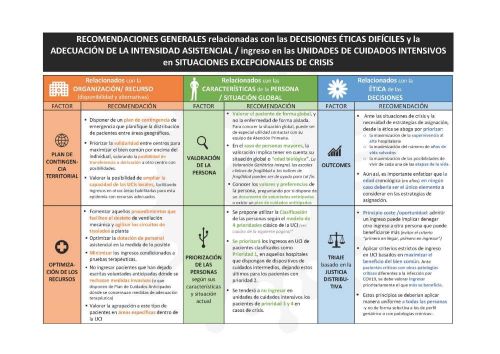The Bioethics and Law Obs.
Master in Bioethics and Law
UNESCO Chair in Bioethics
Contact
- Bioethics and Law Observatory
- UNESCO Chair in Bioethics
- University of Barcelona
- Faculty of Law
- Ave. Diagonal, 684
- 08034 Barcelona
- (+34) 93 403 45 46
- obd.ub@ub.edu
- Master in Bioethics and Law
- (+34) 93 403 45 46
- master.bd@ub.edu
OBD endorses the recommendations for ethical decision-making in the care of patients with COVID-19 infection of the Deontology Commission of the Official College of Physicians of Barcelona
The proposal contains 31 recommendations to support ethical decision-making and adjust the care intensity in light of a possible overcrowding in Intensive Care Units and Emergency services.
 The novel coronavirus infection which is already affecting more than 17,000 people throughout Spain threatens to imminently over-burden the medical care system and exhaust the health resources. Following the proposal of the deontology commission of the Official College of Physicians of Barcelona de Barcelona and based on the Ethical recommendations for ethical decision making in exceptional situations of crisis due to COVID-19 pandemic of the the Spanish Society of Intensive, Critical Medicine and Coronary Units (SEMICYUC), several scientific societies and research institutes have upheld the proposal that aims to guide ethical decision-making in patient admission and management, resource optimization, logistic arrangement or therapeutic intensity adjustment.
The novel coronavirus infection which is already affecting more than 17,000 people throughout Spain threatens to imminently over-burden the medical care system and exhaust the health resources. Following the proposal of the deontology commission of the Official College of Physicians of Barcelona de Barcelona and based on the Ethical recommendations for ethical decision making in exceptional situations of crisis due to COVID-19 pandemic of the the Spanish Society of Intensive, Critical Medicine and Coronary Units (SEMICYUC), several scientific societies and research institutes have upheld the proposal that aims to guide ethical decision-making in patient admission and management, resource optimization, logistic arrangement or therapeutic intensity adjustment.
Among the recommendations, there is an emergency plan that includes patient relocation throughout different geographical areas, global patient assessment, the prioritization of medical care according to a classification model that takes into consideration factors like the chances of recovery and the medical history, as well as the possibility of no hospitalization for those patients that are least likely to benefit from it. In addition, the guide recommends providing emotional support to family members and professionals given the psychological impact of medical decisions.
Age should not be the only criterion for prioritizing the care of patients with COVID-19.
It is strongly recommended not to consider the age as the only factor to take in consideration when it comes to assigning resources in response to the issue of the elderly part of the community being the most vulnerable group. The guide advocates for the maximization of the hospital discharge survival and the amount of living years saved just as much as the chances of living throughout each life stage.
Finally, the recommendations include that it is advisable to share the decision-making between health professionals, patients and family members. Effective communication is a matter of stressing importance in order to improve the understanding of the measures taken. Ultimately, these recommendations aim to provide a guide for ethical decision-making in light of a healthcare emergency within a context of scarce resources.



